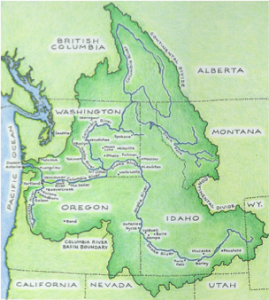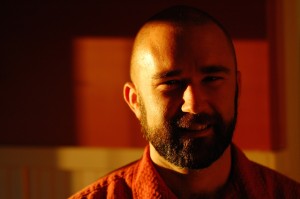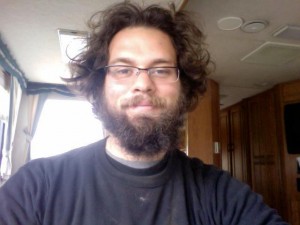 Disciples desperately need resources that will animate a church to engage in transformation by integrating ecological and theological concerns. The EcoFaith Recovery course that interns Matt Cumings and David Pritchett will be leading will address this need under the framework of “Watershed Discipleship.
Disciples desperately need resources that will animate a church to engage in transformation by integrating ecological and theological concerns. The EcoFaith Recovery course that interns Matt Cumings and David Pritchett will be leading will address this need under the framework of “Watershed Discipleship.
Coined by theologian Ched Myers, Watershed Discipleship recognizes that environmental theology and ethics are often too disconnected from the everyday life of the faithful. Implicit to this paradigm is the understanding that the watershed geographic area drained into a body of water is the primary unit of ecological systems, and thus the place where disciples can exert the most influence.
In this course we:
- Explored the history of the watershed in which we live,
- Examined both the ecosystems and colonial history of the area,
- Found practical ways to inhabit our watershed in harmony, with an ear toward the liberatory potential of Scripture and the resources of systems ecology, permaculture, and decolonization theory.
Dates of the course were January 27-March 24
Course cost (pay via check at the first class): $25 if registered before Tuesday, January 13th, $35 after January 13th.
Location: Bethel Lutheran Church, 5658 North Denver Avenue, Portland, OR 97217
Registration is now closed – join our email list to learn about upcoming opportunities
About the course leaders:
Dave Pritchett – EcoFaith Recovery Intern
 My childhood was divided between growing up in the foothills of Mt. Kenya in East Africa as a missionary kid, and high school years spent in Little Rock, Arkansas. More recently, I came from Indiana with my partner, Lizz Schallert. Our three years in Indiana were spent in intentional community with friends as we learned homesteading from our mentors at Joyfield Farm, a group of Anabaptist activists who have been homesteading, market gardening, and peacemaking for 30 years. We are thankful for our time in Indiana, but were glad to leave the flat cornfields for the Cascadian mountains. Since our move in March of 2014, we have been glad to call Wilderness Way community our spiritual home as well as our deep kin here in Portland.
My childhood was divided between growing up in the foothills of Mt. Kenya in East Africa as a missionary kid, and high school years spent in Little Rock, Arkansas. More recently, I came from Indiana with my partner, Lizz Schallert. Our three years in Indiana were spent in intentional community with friends as we learned homesteading from our mentors at Joyfield Farm, a group of Anabaptist activists who have been homesteading, market gardening, and peacemaking for 30 years. We are thankful for our time in Indiana, but were glad to leave the flat cornfields for the Cascadian mountains. Since our move in March of 2014, we have been glad to call Wilderness Way community our spiritual home as well as our deep kin here in Portland.
During our experience homesteading, permaculture, a design science of integrating humans into their landscape in resilient and regenerative ways, captured my imagination. Permaculture has given me tools for thinking in a holistic way how to create communities that live in their particular ecosystem as a part of it, rather than by pretending to be separate from it. With the tools provided by permaculture design, my twin academic pursuits of medicine and theology find common ground in helping faith communities heal our scarred landscapes and reify our disembodied theologies.
I was grateful to get connected early this year with EcoFaith Recovery, and amazed at how it so naturally fits with my own concerns. As a Physician Assistant working in Addiction Medicine, I take seriously the call for recovery from consumerism that is destroying both the environment and our sense of self. As a permaculturalist and theologian, I believe deeply that our faith must heal us as well as our polluted watersheds.
If anyone is interested in having me speak or do permaculture design work for you or your faith community, please email me at dmpritchett@harding.edu.
Matt Cumings – EcoFaith Recovery Intern

I grew up in Muncie, IN spending most of my free time playing outdoors. I was also fascinated by my grandpa’s farm. I remember getting lost in the woods and the scary sounds at night. Mowing yards, playing outdoor sports, and working at a golf course were ways I kept myself outside. After graduating high school I wanted to learn to be a farmer at Purdue University, apparently my grandpa’s 300 acre farm was not going to stand up against corporate giants. Without doing much research I gave up on that dream and decided to study turfgrass science. Somewhere between reading Omnivore’s Dilemma, my father’s declining health, and my further inquiry into American agriculture I changed gears and ended up graduating from Cincinnati Christian University with an Intercultural Studies degree.
Toward the end of my time at CCU I discovered permaculture. Permaculture is a branch of ecological design and agricultural systems focused creating regenerating systems patterned after nature. The three tenets of permaculture are care for earth, care for people, and returning the surplus. It is vital the church address the local issues and its complicit guilt in the destruction of the environment. In order to reconcile, the church must acknowledge past wrongs, seek restitution, and sit at the feet of those that it harmed and be led. In this case it is nature, and that is where permaculture comes in. We need to look not only to the patterns of nature to understand what our lives should look like moving forward practically, but also theologically. That is my goal in life. Projects I have planned are: How Eloheh Withstands a Zombie Apocalypse (with Redbird Woodley); humans, hummus, humility: sheet mulching as the theological practice of humility; Following Indigenous Voices to Bind the Strongman; and Body is to Earth is to Temple: Building Vernacular Structures.
I moved to Oregon to attend George Fox Evangelical Seminary as an M.Div candidate with a concentration in Christian Earthkeeping. Over the summer I switched to the Intercultural Studies program which is led by the North American Institute for Indigenous Theological Studies (NAIITS). I am excited about that because the Native American community is a good example of a relationship the church has failed to reconcile. My switching programs was a microcosm of what I hope to accomplish in the church also, let us be led by indigenous voices (who know the earth best) and other voices in the Christian community that have been previously abused and continue to be marginalized. In conjunction with that I am working at Eloheh Farm, land which is stewarded by Randy and Edith Woodley. Randy is a professor at George Fox and has written books you may be interested in. I especially recommend Shalom and the Community of Creation. Eloheh will be the site of many of the activities integrating permaculture, practical theology, and indigenous culture. I hope to see you at some of the events I have planned. Shalom!
